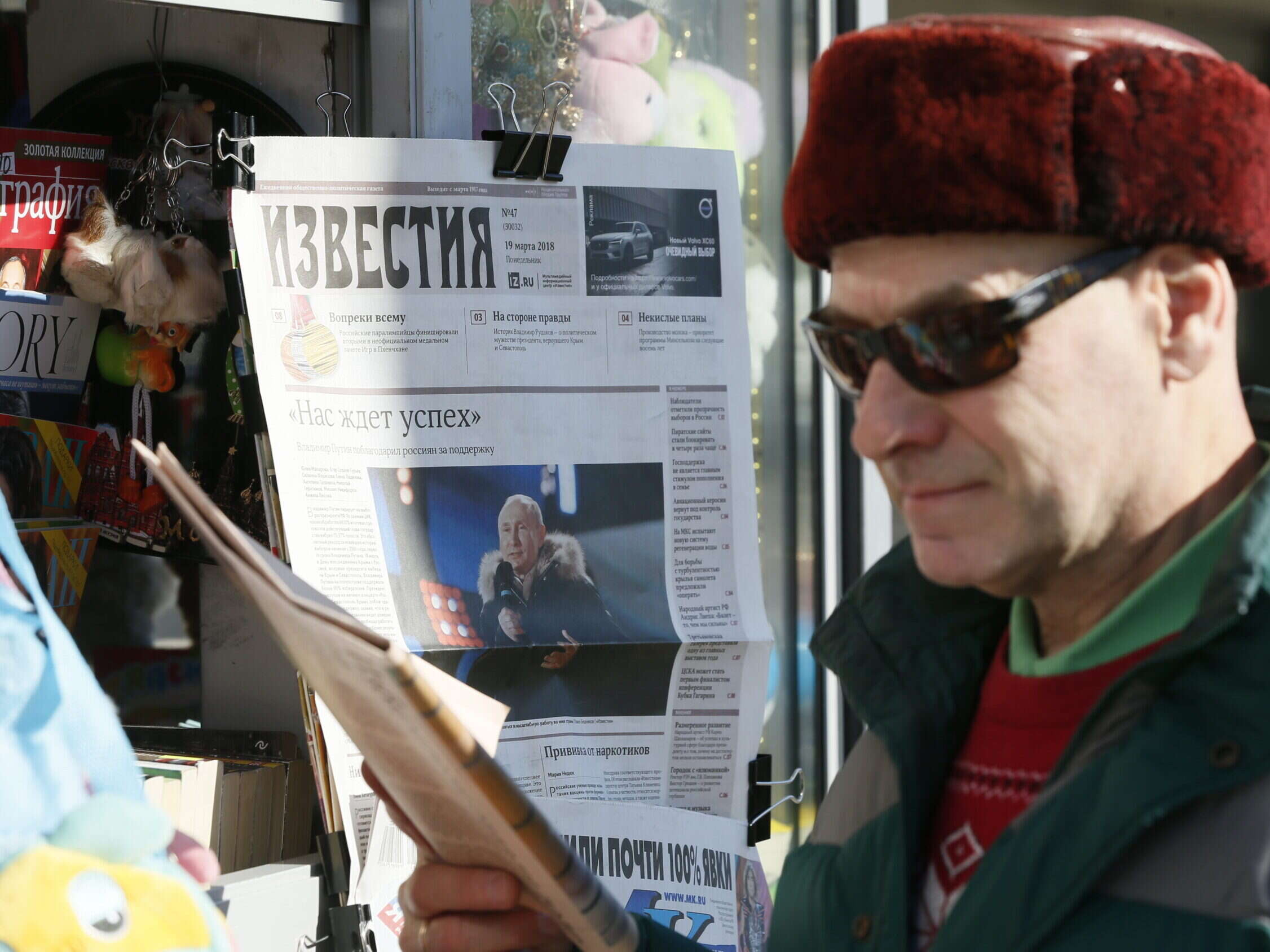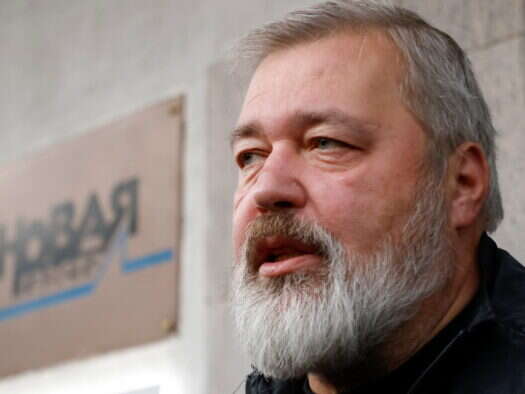
Russian censorship over the Ukraine war has led to the collapse of independent journalism in the country, isolating Russian audiences from the rest of the world.
A change to the Russian Criminal Code, which criminalises the dissemination of “false information” about the Russian military, was passed in March – eight days after the invasion of Ukraine.
Under the law, journalists must comply with official military descriptions of the conflict describing it not as a “war” but a “special military operation”.
Those deemed to have abused their “official position” – including journalists – by passing “deliberately false information” off as “reliable reports” face a ₽3m (£20,600) to ₽5m (£34,000) fine, ten years in prison or compulsory labour. Should these supposed falsehoods be about the Russian military, jail time rises to a maximum of 15 years.

Russian investigative newspaper Novaya Gazeta’s editor-in-chief Dmitry Muratov, one of 2021 Nobel Peace Prize winners, speaks with journalists in Moscow, Russia October 8, 2021. Picture: Reuters/Maxim Shemetov
Since the law was passed, more than 30 independent Russian media outlets have been forced to shut down including Meduza, The Moscow Times, TV Rain, Znack and The Bell.
Leading independent newspaper Novaya Gazeta, edited by 2021 Nobel Peace Prize winner Dmitry Muratov, suspended operations following repeated warnings from Roskomnadzor, the Russian media regulator, while Echo of Moscow, one of Russia’s few independent radio stations, was taken off air during prime time.
Alec Luhn, a Vice News correspondent who was in Russia when it launched its invasion of Ukraine, told Press Gazette “what little independent journalism remained” in the country has gone.
He said: “It became very clear after the invasion that no more independent journalism was going to be tolerated because the stakes were too high. This is an invasion that was very costly. A lot of troops were coming home in body bags.
“It was war, and the Kremlin didn’t want anybody even thinking about questioning the motivations for that war, the cost of that war, the necessity of that war. They just wanted to mobilise the population and not have any kind of nosy journalists kicking up any doubt.”
How does the Russian ‘fake news’ law affect coverage of Ukraine?
Samuel Greene, director of the Russia Institute at King’s College London, told Press Gazette: “Media outlets with any kind of a presence really in Russia have had to make very difficult decisions about how they deal with the law. So some have decided to go along with the state’s insistence that this be referred to as a special military operation and not a war; that they only rely on, essentially, official sources of information or at least not contradicting them directly.
“That’s a pretty big pill to swallow for anybody who considers themselves an independent journalist, so others have decided that if they can’t cover it, honestly and safely, then they won’t cover it at all.” Other journalists fled the country so they could keep reporting safely, he added.
However, a line has emerged between Russian journalists and foreign correspondents who, it is believed, face less risk of prosecution from the new law.
Vice’s Luhn said: “It’s this Orwellian situation that’s developed… Russian outlets were being forced to take down articles, and were being forced not to use the word war, were being taken off the air, were being shut down, and were being declared foreign agents, undesirable organisations, etc, etc. Those laws are not really being applied to foreign correspondents in Russia.”
However it can be hard, he said, for foreign journalists to know what the “new normal” is after such rapid deterioration of the press freedom climate in Russia, leaving them operating in a “grey area” of “unwritten rules”.
“If a person of influence is rubbed the wrong way by something you report, then they have a million tools at their disposal to come after you,” he said, adding that the new “draconian regulations haven’t really been applied to a foreign correspondent yet. But they could. And when is that moment going to come…?”
The rapidly changing and strict nature of the rules, both written and unwritten, has made many foreign organisations uncomfortable operating in Russia. The BBC, CBC, Bloomberg, CNN, CBS, ABC, New York Times and Conde Nast all partially or fully suspended their coverage from within Russia following the passing of the “fake news law”.
The BBC initially suspended all news gathering in Russia, before resuming some coverage in English from its correspondents including Russia editor Steve Rosenberg.
Simon Wilson, BBC regional editor for Europe and Americas, told Press Gazette this was a decision taken “based on the risk to your journalists as against the need to gather, which obviously, is very high in Russia”.
Explaining why the BBC’s Russian language operations are still suspended even after English reporting resumed, Wilson said Russian authorities seemed to have taken action primarily against local journalists “although the new laws were, in principle, all encompassing”.
How does Russian censorship shape society?
This rapid removal of independent news has had a dramatic impact on Russian perception of Ukraine. KCL’s Greene said: “The ability of journalists to gather that information to bring it to you directly has been severely reduced. And so [audiences] have to spend more time trying to piece together, just a much more fragmented story.”
This has led to situations where people in Russia with friends and relatives in Ukraine have accused them of lying about their experiences of the war, Greene said. “People getting phone calls from relatives who are sheltering in basements in various Ukrainian cities, under bombardment from the Russian military, and their Russian relatives are saying ‘you’re lying and I know you’re lying, because on television they tell us that we’re not bombing Ukraine’.”
Despite a “baseline level of mistrust” and awareness that the state controls the media, Greene said that “what seems to be capturing the attention of the majority of the population are these sort of pro-war messages and discourses coming from state TV”. Polling from the Leveda Centre found in February that 60% of Russians blamed the US and NATO for the rise in tensions with Ukraine. This follows prior polling from Leveda in 2021 that found 62% of Russians get their news from (state-dominated) TV broadcasts.
Even before the war, Reporters Without Borders ranked Russia 150th out of 180 countries for press freedom in 2021, stating that TV is “firmly in government hands”. Russia fell to 155th place this year. “It was never a good situation, really, and it kind of had been deteriorating over the years,” Luhn said.
Previously journalists could be targeted by being classified as foreign agents while the Undesirable Organisations Law could quickly outlaw and shut down opposition media organisations. However “after the invasion, the other shoe came down,” Luhn added.
How do people in Russia access blocked news websites?
Online, more than 100 foreign news and social media websites including BBC World Service, The Telegraph, Twitter, Facebook, Instagram have been blocked in Russia since the invasion in February.
The BBC insists, despite these blockades, that it is still getting through to the Russian populace. Wilson said: “It’s harder for people to reach us because of the blocking but we put information in relevant places about how to circumvent blocking, and the numbers still stuck up.” For example the BBC publicised “deep web” versions of its Russian and Ukrainian sites, which are only accessible using the anonymous Tor browser.
In the last week of February, before BBC News Russian services were blocked on 4 March, the corporation said its Russian-language digital platforms reached a record almost 17 million people. This month it said that although the number of people in Russia directly accessing its website has dropped, there are “still millions of people in Russia accessing BBC News”.
In particular, its Russian live blog page is still performing strongly with strong indicators that many viewers were using a VPN, which gives users anonymity and privacy online, or Google AMP. The BBC also said that while its Russian online viewers had dropped, it had tripled its reach on social media to almost eight million – suggesting many Russians are accessing the BBC on social media instead.
For those wanting to evade online censors, VPN is the main option: the Washington Post found approximately 30% of Russian internet users used one, with downloads skyrocketing from around 15,000 to over 400,000 almost every day of March following the news blocks. “VPN has been a reality for the past couple of years for anyone wanting to access any sort of foreign news,” Luhn said. However this has led to a “constant cat and mouse game”, he added, as censors regularly shut down VPNs until the next software patch comes along.
Even with VPN, problems run deeper. As Luhn explained, Russians “could still go and get a VPN and go look up truthful information about the war. But a – that’s difficult. People don’t have time to read the news anyway. It’s hard to jump through all these hoops to go and read real news.
“But b, and more importantly, a lot of Russians, I think, don’t want to necessarily ask that kind of uncomfortable question of themselves. If you’re stuck in Russia and all your friends are in favour of the war and are supporting Putin, it’s really hard for you to open up that foreign news source and start reading about all the awful things that are happening and start questioning this whole existence that you’re having to live.”
What will the future of journalism in Russia look like?
Greene and Luhn both stressed that, while coverage of the Ukrainian front and civilian life within Ukraine has been widespread outside Russia, the rapid implementation of censorship measures, withdrawal of foreign news services and removal (by choice or otherwise) of independent journalism has severely reduced the news coming out of Russia.
Greene said: “We have much, much less idea of what’s going on inside Russia itself… so the average news consumer is left to guess about what level of support for this war [in] Russia really is…” This loss of visibility, he said, may prove an issue in a post-war landscape when the west must continue to engage with Russia.
The BBC’s Wilson, however, is optimistic. Despite Russian censorship proving “one of the biggest” challenges to journalists today, he told Press Gazette: “People still have a fairly good idea of what’s going on inside Russia, it’s not a closed world, it’s not closed to us like you might say North Korea is.”
He added: “It’s not the first country that passed laws making it difficult to report… I’m sure in the future there’ll be a time when BBC Russian can reach in greater numbers than we are now.”
Luhn, however, remains concerned for independent media in Russia – even if the war comes to an end.
He said: “I don’t think that the independent media is coming back. There’s a lot of great work being done outside the country. Meduza, BBC Russian Service… a lot of great outlets are now working and reporting on Russia from outside of Russia, but independent journalism inside Russia is dead.
“It’s hard to be optimistic when every independent Russian journalist I know has left Russia. Of course, if and when the war ends the situation will change but… given the slow erosion of free speech over the years in Russia, it’s really hard to imagine that bouncing back.”
Picture: Reuters/Gleb Garanich
Email pged@pressgazette.co.uk to point out mistakes, provide story tips or send in a letter for publication on our "Letters Page" blog
